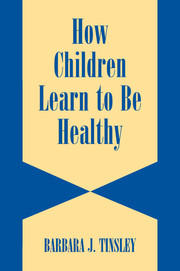Book contents
- Frontmatter
- Contents
- Acknowledgments
- How Children Learn to Be Healthy
- Introduction
- 1 Mechanisms and Consequences of Socializing Children to Be Healthy
- 2 Children's Health Understanding and Behavior
- 3 Parents' Health Beliefs
- 4 Parents' Promotion of Their Children's Health
- 5 Parents' Promotion of Their Children's Sexual Health
- 6 Peers, Schools, and Children's Health
- 7 How Television Viewing and Other Media Use Affect Children's Health
- 8 The Social Ecology of Children's Health Socialization
- 9 Summary and Conclusions
- References
- Index
9 - Summary and Conclusions
Published online by Cambridge University Press: 27 July 2009
- Frontmatter
- Contents
- Acknowledgments
- How Children Learn to Be Healthy
- Introduction
- 1 Mechanisms and Consequences of Socializing Children to Be Healthy
- 2 Children's Health Understanding and Behavior
- 3 Parents' Health Beliefs
- 4 Parents' Promotion of Their Children's Health
- 5 Parents' Promotion of Their Children's Sexual Health
- 6 Peers, Schools, and Children's Health
- 7 How Television Viewing and Other Media Use Affect Children's Health
- 8 The Social Ecology of Children's Health Socialization
- 9 Summary and Conclusions
- References
- Index
Summary
Throughout this book, I have reviewed the results of many studies of how children learn to be healthy. I have described and critiqued a variety of theories that attempt to explain and interpret the detailed and highly complex information compiled by theorists and researchers in their effort to understand children's health learning and behavior. Neither data nor the many theories advanced are final answers in the continuing attempt to unravel the puzzles of children's health. As in any field of science, our information about how children learn to be healthy is constantly expanding and changing.
Research on influences on children's health attitudes and behaviors has now achieved considerable momentum, accompanied by an increase in attempts to model these multiple influences, as indicated throughout this book. In this final chapter, I wish to reiterate some of the broad themes that I have emphasized in the preceding chapters concerning how children learn to be healthy. First, these compiled theories and studies illustrate that children experience both continuity and discontinuity in the health information they receive from socialization agents such as the family, peers, schools, and the media. Thus, the burden of integrating health socialization falls on the child. However, when these agents of socialization are coordinated in their efforts to modify children's health attitudes and behavior, success rates are often higher. Even media usage can be coordinated to provide consistency across the socialization offered by parents, schools, and peers.
- Type
- Chapter
- Information
- How Children Learn to be Healthy , pp. 124 - 128Publisher: Cambridge University PressPrint publication year: 2002

